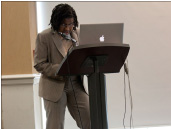
By Amy Macintyre
Correspondent
Journalism professor Kim Pearson took time out of her year-long sabbatical to conduct a politics forum called “The Challenge of Democratization Civic Media” in the Business Building lounge. This was the final politics forum of the semester and was hosted by the Political Science Department.
Civic Media, as defined by the Massachusetts Institute of Technology, is “any form of communication that strengthens the social bonds in the community and creates a strong sense of civic communication amongst its residents,” Pearson explained at the beginning of her presentation.
“I am going to share with you some reflections about the state of our news media/civic media that is rapidly replacing what we have known,” she said.
The presentation was part of Pearson’s ongoing research to further understand and detail the changing atmosphere of online journalism that she is calling “The Re-education of Me,” a working title.
Pearson calls the new media format of online journalism, citizen journalism, blogging and podcasting the “brave new world,” of which she has been an active participant. During the past several years the professor created the blog Professor Kim’s News Notes, the online College news magazine Unbound (which she co-created with art Professor Elizabeth Mackie and a group of students) and the Interactive Journalism Institute for Middle Schoolers, a project designed to introduce middle schoolers from underrepresented populations to online journalism. Pearson is also a paid contributor to BlogHer.com.
Pearson said she called her presentation “The Democratization of Civic Media” because the abundance of media technology today that enables everyone to be a content creator is a mixed blessing for “democratic discourse” whether it promotes civic engagement or is used to invade the public’s privacy.
According to Pearson, news media today is suffering from not only a severe economic crisis, but is having pervasive difficulties identifying and redefining their business model to better suit readers.
“It is no secret that the news and publishing industries are in an unprecedented state of crisis and flux,” she said.
Pearson went on to say that media has changed from being centered in an archaic business model to a user-centered model that is not explicitly based on credibility or news worthiness.
“Newspaper credibility has been declining for decades. Certainly the development of new media technologies has exacerbated this problem,” she said.
Another factor that contributes to this problem is “spreadability,” which Pearson defined as the ability for information and content to be spread socially.
“Models are only as good as the data and assumptions that they are built on, so sometimes spreadable culture can spread inaccuracies as much as they can spread useful information,” Pearson said. “There is some research that has found, for example, that on YouTube the most popular videos featuring African Americans are those that actually replicate stereotypes.”
Pearson said an example of this is the popular “Bed Intruder Song,” which has received over 40 million hits on YouTube.
“The most popular videos are those that project the most simplistic ideas which may not necessarily be helpful when you are trying to help people understand something that might have some complexity to it,” she explained.
Pearson will continue to pursue her research on civic media during the remainder of her sabbatical and will also continue as a contributor to BlogHer.com.






